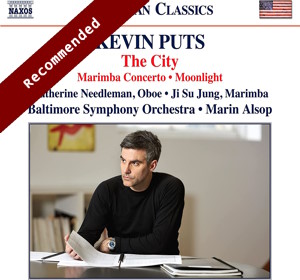
Kevin Puts (b. 1972)
Marimba Concerto (1997, rev. 2021)
The City (2016)
Moonlight (Oboe Concerto No. 2) (2018)
Ji Su Jung (marimba)
Katherine Needleman (oboe)
Baltimore Symphony Orchestra/Marin Alsop
rec. 2016-21, Joseph Meyerhoff Symphony Hall, Baltimore, USA
First recordings
Naxos 8.559926 [67]
This is my first encounter with the American composer Kevin Puts. I did recall some favourable reviews of earlier releases, and when I checked back (before requesting the disc), I found encouragement in John Quinn’s summary of Puts’ music as “accessible, appealing and well-imagined” (review ~ review). Having quoted these adjectives from John’s reviews, I have now painted myself into a corner in terms of my own review.
Puts won the Pulitzer Prize for his 2012 opera Silent Night (also recorded by Naxos, 8.669050/1), and his most recent opera, The Hours, has been staged by the Met, with Renée Fleming, Joyce diDonato and Kelli O’Hara in the lead roles. With numerous recordings featuring his music, he is clearly a significant name in contemporary classical music. It is, therefore, a matter for some celebration – at least as far as I’m concerned – that his music is accessible and appealing (to quote John again).
The three substantial works presented, all a little over twenty minutes, are placed in chronological order. The Marimba Concerto, written while he was a student, is not a type of concerto I have much experience with, but from the Mozartian opening bars (in his excellent notes, Puts specifically refers to two of Mozart’s E flat piano concertos as models), I was entranced. It is simply gorgeous. My reference points, which may be less useful for many of you, are Latvian Georg Pelēcis, especially his Flowering Jasmine, Australian Graeme Koehne and New Zealander Gareth Farr, but you could also throw in some John Williams.
The City was originally intended to be a portrait of Baltimore in particular, and American cities in general. It was co-commissioned by Carnegie Hall and the Baltimore Symphony to mark significant anniversaries, which certainly gives further indication of the esteem in which Puts is held. Its composition was affected by racial tensions in Baltimore, triggered by the death of Freddie Gray in police custody in 2015. One might also see it as a “concerto for orchestra”, given the significant solo parts spread around the orchestra’s sections. It is quite an ask to sustain musical ideas and flow in a single movement spanning more than twenty-two minutes, but Puts does so. The moods shift from high spirits to elegiac and stately, and to an outburst of anger and violence a little past halfway. The work closes in peace and optimism.
The oboe concerto is the toughest listen of the three by some distance. Given that the work was written in the aftermath of the 2016 presidential election, it is hardly surprising that the mood is less than rosy. The first movement gives the work its title, and derives from a movie of the same name that Puts watched during a flight. His usual melodic style is still there, but veiled in uneasy rhythms and textures. The fast middle movement Folly is ugly, violent and shrill, reflecting the divisions created by the election result. As in The City, the finale Air (The Eye begins To See) returns us to some measure of peace and hope, the oboe singing, not shrieking.
Marin Alsop is clearly a devoted advocate of Puts’ music, as this is the third recording of his music she has directed. The performances of orchestras and soloists are excellent, and Alsop directs them with an obvious understanding of the Puts soundworld. The City and Moonlight are from live recordings, but you would not know. The sound quality across all three is excellent; the marimba sounds as though it is in the room with you.
I have been so impressed by this recording. The Marimba Concerto will go on my Frequently Played playlist, and I will seek out more of Kevin Puts. This is the third review in the last four which I have felt compelled to nominate as a Recommended; given my usual average is probably one in ten, I fear I might be in for a dry spell.
David Barker
Help us financially by purchasing from





















